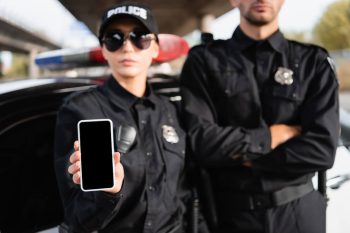Are Police Required to Have a Valid Search Warrant to Search Your Phone in New Jersey? Our Attorneys Explain the Technicalities
 Where does more personal information, financial information, and even insight into your thoughts and behaviors reside than any other single place? A little device that you probably carry with you everywhere you go: your phone. Since cell phones have become such an integral part of our lives, they can also provide key information to law enforcement in criminal investigations. Information on your cell phone can reveal the locations you have recently traveled to, who you have been talking to, text messages, emails, and social media messages you sent, searches you conducted, and websites you visited.
Where does more personal information, financial information, and even insight into your thoughts and behaviors reside than any other single place? A little device that you probably carry with you everywhere you go: your phone. Since cell phones have become such an integral part of our lives, they can also provide key information to law enforcement in criminal investigations. Information on your cell phone can reveal the locations you have recently traveled to, who you have been talking to, text messages, emails, and social media messages you sent, searches you conducted, and websites you visited.
If you were stopped by police and they asked to see your phone, what would you do? Would you know and understand what your rights are in that situation? Understanding your rights and how to properly respond to police if you ever find yourself in this situation is critical, as lack of knowledge in this area could implicate you and/or others in a crime and be used as evidence to secure a conviction against you.
Know Your Rights Concerning Police Requests to Search Your Phone in NJ
The police can request to search your phone at any time, if they have valid grounds to stop you. The key word here is request. If a police officer asks to search your phone, they are seeking your consent for the search. Providing your phone to law enforcement when they ask will probably be interpreted as you giving consent to the police searching your phone. If you consent to the search because you didn’t realize that you could have declined, then any evidence against you that the police find in your phone could be used against you in a criminal case.
There are other situations where the police may not ask for your permission to search your phone at all. What happens in those situations depends on many different factors that all relate back to your 4th Amendment right against unreasonable search and seizure and whether an exception to this rule existed under the circumstances. Your 4th Amendment rights apply to anything you have a reasonable expectation of privacy over. Courts have found that people have a reasonable expectation of privacy over their cell phones, due to all of the personal information they contain.
As a result, the police must either obtain your consent to search your phone, obtain a search warrant, or be able to show that there were exigent circumstances. These exceptions are very limited, particularly in the context of searching a cell phone. For example, while the police may conduct a warrantless search incident to arrest, this type of search applies only to the individual’s person and immediate area to ensure the safety of the officer and others. When an individual is arrested, their cell phone and other personal belongings will be collected by the police, but that doesn’t mean the police have the right to search through the cell phone. To do that, they must obtain a warrant unless they have the defendant’s consent. This 4th Amendment protection was upheld in the landmark U.S. Supreme Court case Riley v. California.
The police may search your phone without a warrant if they have reasonable belief that there is an imminent threat of the evidence being destroyed. While such circumstances may arise, they are likely rare. If you lose your phone and the police find it, these Constitutional protections still apply because you have a reasonable expectation of privacy to your phone. Just like if you leave your home unlocked and unattended, these actions do not suspend your 4th Amendment rights against unreasonable search and seizure and signal a green light for police to search your home without a warrant. The same is true for your phone.
Is it Legal for Police to Demand Your Phone and Access Codes?
There is also the issue of password protected phones. The police could ask for your phone and access code, and you could choose to disclose that information. But does the government have the right to compel a cell phone owner to disclose their password? In New Jersey, they do. The New Jersey Supreme Court ruled against an Essex County defendant who tried to argue that his 5th Amendment right against self-incrimination protected him from being compelled to disclose the password to his phone. The court rejected this argument, finding that disclosing the password was not a testimony but a surrender. There’s nothing, necessarily, incriminating about a password, as there may or may not be any evidence of a crime on the phone. It’s more akin to handing over the key to your apartment when the police have a valid warrant to search your home. Therefore, the Essex County Prosecutor’s office was able to obtain a court order requiring the defendant to disclose his passcode and the requirement did not violate his 5th Amendment rights. However, it is important to emphasize that the police must still have a search warrant or exigent circumstances to search the phone.
If an individual claims they do not remember the code to unlock their phone, they may face serious legal consequences if that statement is untrue. Since phones are a part of our daily lives, a judge may find such a claim to lack credibility. If there was a court order to compel disclosure of the access code, then the individual may be held in contempt of court. They could also face criminal liability for obstruction of justice and/or making false statements to police.
Protecting Your Rights if Police Conducted an Illegal Phone Search in NJ
 Anytime the police obtain evidence in a way that violates an individual’s rights against unreasonable search and seizure, the evidence is inadmissible in court. This legal doctrine is known as the fruit of the poisonous tree. If the process of obtaining the evidence was improper, then the evidence cannot be used. This is true for any evidence that the police or prosecutors obtain from a cell phone that they did not have the right to access either because they lacked consent from the cell phone owner, did not obtain a search warrant, or there were no exigent circumstances present that rendered the search valid despite the lack of a search warrant.
Anytime the police obtain evidence in a way that violates an individual’s rights against unreasonable search and seizure, the evidence is inadmissible in court. This legal doctrine is known as the fruit of the poisonous tree. If the process of obtaining the evidence was improper, then the evidence cannot be used. This is true for any evidence that the police or prosecutors obtain from a cell phone that they did not have the right to access either because they lacked consent from the cell phone owner, did not obtain a search warrant, or there were no exigent circumstances present that rendered the search valid despite the lack of a search warrant.
If you believe that police improperly searched your cell phone, then any evidence they obtained through the search should be inadmissible in court. In these cases, it is critical to have all of the facts of the case examined by a knowledgeable New Jersey criminal defense lawyer. If criminal charges have been filed against you, the prosecution has the burden of proving each element of the offense beyond a reasonable doubt. If evidence obtained from illegally searching your cell phone is ruled to be inadmissible, then, depending on the facts of the case, the prosecution may have difficulty meeting their burden against you in court.
Talk to the Defense Lawyers at Our South Jersey Firm for Guidance on Lawful and Unlawful Phone Searches
Challenging the admission of evidence and presenting a 4th amendment violation argument is no job for an inexperienced criminal attorney, let alone for a defendant to do themselves. You want a skilled and seasoned criminal defense lawyer to make sure that evidence never becomes part of the record in the prosecution’s case against you. For more information on how our team of criminal defense lawyers at Chamlin, Uliano & Walsh can help you defend against criminal charges in Tinton Falls, Red Bank, Holmdel, Belmar, Manasquan, Howell, Middletown, Freehold, Eatontown, and neighboring communities, contact 732-229-3200. You can also complete our contact form to find out how we can safeguard your rights.
